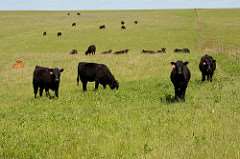
It’s been nearly 14 years since China allowed sales of U.S. beef in that country, but that may be about to change. And that’s very good news for the U.S. beef and cattle industry, according to a Kansas State University agricultural economist.
“As the most populated country in the world, with a large and growing middle-income class, gaining direct access to China is one of the most positive developments the U.S. beef industry could ask for,” said Glynn Tonsor, livestock marketing specialist with K-State Research and Extension, commenting on news that a deal was struck between Chinese President Xi Jinping and President Donald Trump in an April meeting.
China, however, agreed previously to end a ban on U.S. beef it had imposed in 2003, but conditions on opening that market have yet to be worked through. China, along with many other countries, imposed the ban in 2003 when a case of bovine spongiform encephalopathy, also called mad cow disease, was confirmed in a cow in the U.S.
With a population of more than 1.3 billion people, China presents a huge potential market for U.S. beef. By comparison, the U.S. population is 324 million, according to the U.S. Census Bureau.
Over the past 10 years, Japan, with a population of 127 million, has been the biggest importer of U.S. beef.
Tonsor said he and other economists expect overall meat demand to grow at a faster rate outside the U.S. than inside the country. Given that, any and all developments such as this which increase viability of exporting U.S. beef are beneficial.
“While we live in an era of fairly widespread skepticism around the net benefits of global trade, it is important to recognize a key fact as a U.S. cattle producer: Any time you can sell your product to consumers who most value it, the higher the collective sales value of beef products (and the cattle they originate from) will be,” Tonsor said. “Gaining – and retaining – access to a larger set of candidate consumers is vital to the ability to accomplish this. This point is only reinforced when one appreciates the vast diversity of beef products that come from a sole animal and how this aligns with a corresponding assortment of consumers who most value each of those products.”
Source:k-state.edu